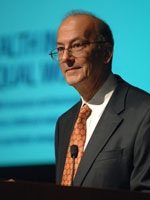New hope for African medical education
March/ April 2011 | Volume 10, Issue 2
Opinion by Dr. Roger I. Glass
Director, Fogarty International Center
It was extraordinarily moving to participate recently in the landmark gathering of African leaders in Johannesburg, where we launched a new program aimed at transforming medical education in sub-Saharan Africa. I’m pleased and proud that Fogarty is jointly administering the Medical Education Partnership Initiative (MEPI) program with the Health Resources and Services Administration, with funding from the U.S. President’s Emergency Plan for AIDS Relief (PEPFAR) and NIH.
The meeting convened an amazing group of luminaries and illustrated how this new program is not only doing wonderful things for medical education, it’s also bringing African leaders in biomedical education together to talk about issues they have in common. They realize they share many of the same problems but have addressed them with different and sometimes novel approaches.

Dr. Roger I. Glass, Director of
the Fogarty International Center
For example, Uganda and Zambia are engaging all their medical education institutions, along with ministries of health and education, in their effort to expand and improve training capacity and bringing together all medical schools. MEPI is not only to improve the quality but also the breadth of medical education, to fill gaps in key areas such as pathology, emergency medicine and basic science. The University of Stellenbosch is addressing South Africa’s massive need to work on HIV/AIDS. They’re scaling up training for all levels of personnel so that clinical officers and nurses can initiate and monitor patients on treatment, allowing expansion of programs to underserved rural areas, where so many are suffering.
All the participants in MEPI are in senior positions and have been engaged with trying to improve medical education in their countries but have been hampered by lack of resources. At Makerere University in Uganda, enrollment hasn’t changed in 30 years. They didn’t have the capacity to do that. The MEPI program provides the opportunity for medical school deans to do things they have only been able to imagine until now. It will allow them to reach out to support the five other medical schools in the country. It’s terribly exciting and could really transform medical education and ignite innovation.
Some incredible people are engaged in this effort. They are so wise, they have been thinking about how to do this and have been striving within the limits of what they could achieve for decades. Now, MEPI is breathing new life into their efforts, expanding their horizons, removing hurdles and placing resources and responsibilities in the hands of local leaders. Through this partnership, they will be better able to match their educational needs with the needs of their country’s health system and the unique health issues of their own population. They’ll be able to better calibrate the supply of the health care work force with the demands of the health system. Perhaps most importantly, this program is formalizing their ability to network and learn from each other by sharing curricula, best practices and research discoveries.
MEPI is also transformative in terms of broadening the available expertise to better meet the growing tide of chronic illness. So many of the projects we’re engaged with are vertical and focus exclusively on malaria, HIV/AIDS or immunization, with training focused quite narrowly on the associated tasks required. This is providing the funding so faculty can broaden the training they offer to generate health care workers with the skills that are needed.
This visionary program and extraordinary investment in African institutions puts the responsibility where it belongs, with the local leaders who have the creativity and the vision to transform how they train doctors, nurses, scientists and health care workers to better meet the needs of the people they serve. I have great hopes for what can be achieved.
More Information
To view Adobe PDF files,
download current, free accessible plug-ins from Adobe's website.